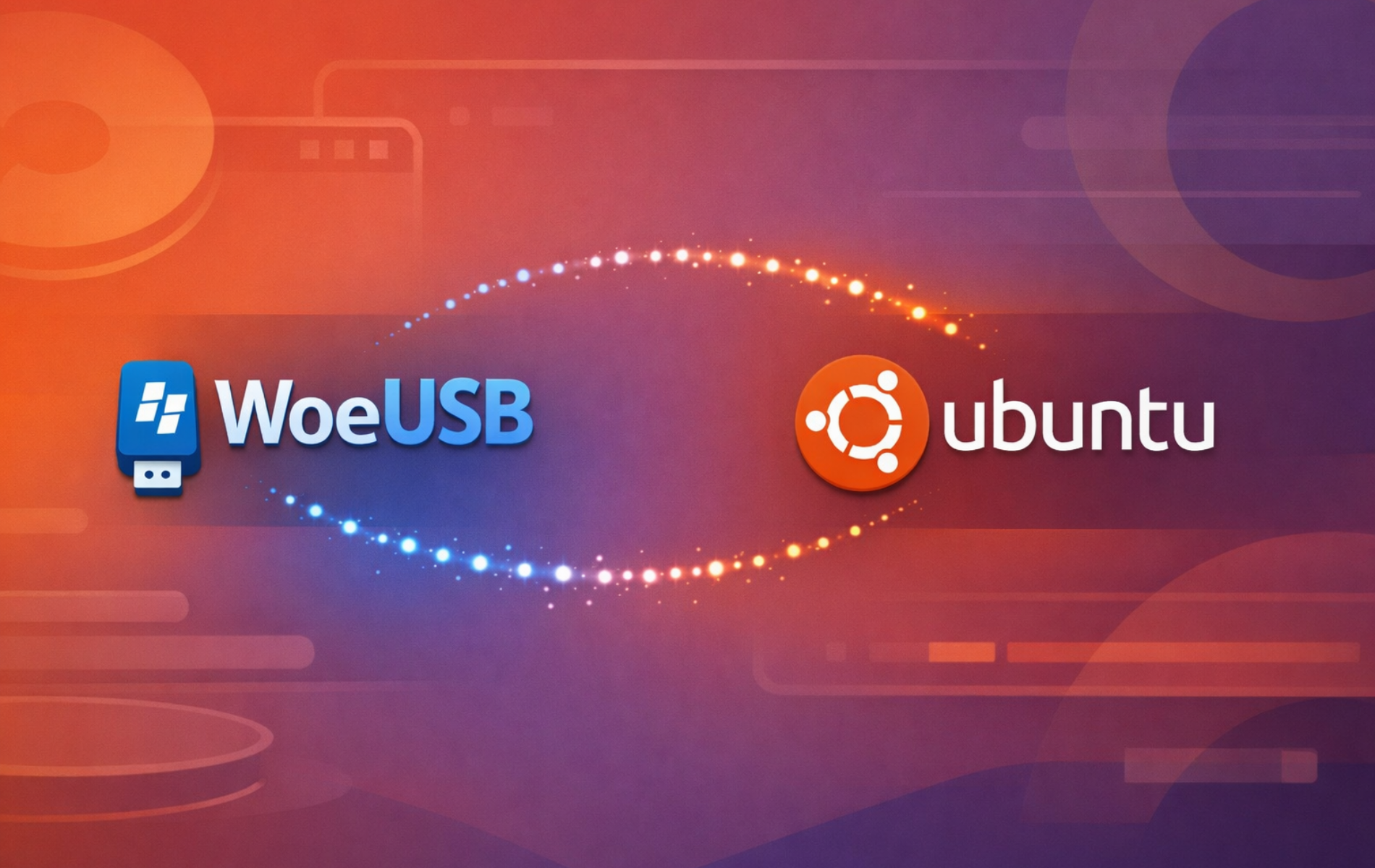Creating a bootable Windows USB drive from Linux can be tricky since most tools like Rufus are Windows-only. WoeUSB fills that gap by writing a Windows ISO (or physical DVD) to a USB stick straight from the terminal. The upstream project has not seen a release since late 2021, but the CLI tool still works on supported Ubuntu releases. A Launchpad PPA maintained by tomtomtom provides pre-built packages, so you can install WoeUSB on Ubuntu without compiling anything.
The WoeUSB project has not released an update since late 2021. The CLI tool still works on Ubuntu 24.04 and 22.04 through the PPA, but Ubuntu 26.04 does not have builds yet and future compatibility is not guaranteed.
Install WoeUSB on Ubuntu via Launchpad PPA
Update your system packages before adding the PPA:
sudo apt update && sudo apt upgradeYour user account needs
sudoprivileges for the commands in this guide. If you have not configured sudo yet, see how to add a user to sudoers on Ubuntu.
Add the WoeUSB PPA so APT can find the package:
sudo add-apt-repository ppa:tomtomtom/woeusb -yUbuntu version support: The PPA has published packages for Ubuntu 24.04 (Noble) and 22.04 (Jammy). Ubuntu 26.04 (Resolute) does not have builds yet. If you are on 26.04, this method will not work until the PPA maintainer publishes resolute packages.
The command above automatically refreshes your package index after adding the PPA. Install WoeUSB:
sudo apt install woeusb -yVerify the WoeUSB Installation
Check that the package installed successfully:
apt-cache policy woeusbwoeusb:
Installed: 5.2.4-1~ppa~noble
Candidate: 5.2.4-1~ppa~noble
Version table:
*** 5.2.4-1~ppa~noble 500
500 https://ppa.launchpadcontent.net/tomtomtom/woeusb/ubuntu noble/main amd64 Packages
100 /var/lib/dpkg/status
WoeUSB Command Examples on Ubuntu
WoeUSB runs entirely from the terminal. The PPA also ships a GUI package (woeusb-frontend-wxgtk), but it has not been updated in years and is no longer recommended.
View all available flags and options:
woeusb -hCreate a Bootable Windows USB with WoeUSB
Writing a Windows ISO to a USB drive is the most common use case. Replace /path/to/windows.iso with your ISO file and /dev/sdX with the target USB device. Run lsblk beforehand to identify the correct device name:
sudo woeusb --device /path/to/windows.iso /dev/sdXWarning: This command erases all data on the target USB drive. Double-check the device path with
lsblkbefore running it. If the USB drive is mounted, unmount it first withsudo umount /dev/sdX*.
Other Useful WoeUSB Commands
List available storage devices to identify your USB drive:
woeusb --listCreate a bootable USB from a physical CD/DVD drive instead of an ISO file:
sudo woeusb --device /dev/sr0 /dev/sdXUpdate or Remove WoeUSB from Ubuntu
Update WoeUSB
PPA packages update alongside the rest of your system. A standard system update picks up any new WoeUSB releases:
sudo apt update && sudo apt upgradeTo upgrade only WoeUSB without touching other packages:
sudo apt install --only-upgrade woeusbRemove WoeUSB from Ubuntu
Uninstall WoeUSB and clean up orphaned dependencies:
sudo apt remove woeusb && sudo apt autoremoveIf you no longer need the PPA, remove it and refresh your package index:
sudo add-apt-repository --remove ppa:tomtomtom/woeusb -y && sudo apt updateConfirm the package is fully removed:
apt-cache policy woeusbN: Unable to locate package woeusb
For more details on managing PPAs, see how to remove a PPA from Ubuntu.
Troubleshooting WoeUSB on Ubuntu
WoeUSB Fails with “Target Device Is Currently Busy”
This error means the USB drive is still mounted. Ubuntu’s desktop environment often auto-mounts removable drives when you plug them in. Unmount all partitions on the device first:
sudo umount /dev/sdX*Then re-run the woeusb --device command.
PPA Shows “Unable to Locate Package woeusb” on Ubuntu 26.04
The PPA does not publish packages for Ubuntu 26.04 (Resolute) yet. If you are on 26.04, consider building WoeUSB from source or using WoeUSB-ng, a Python rewrite installable via pip or pipx. Neither the original WoeUSB nor WoeUSB-ng are actively maintained, so compatibility with newer kernels and filesystems is not guaranteed.
Frequently Asked Questions
No. WoeUSB is not packaged in the official Ubuntu archives. You need to add the tomtomtom Launchpad PPA to install it through APT.
Not currently. The PPA publishes packages for Ubuntu 24.04 and 22.04. Ubuntu 26.04 (Resolute) returns a 404 when the PPA is added, meaning no builds exist for that release yet.
The PPA includes woeusb-frontend-wxgtk, but it has not been updated in years and is no longer recommended. The CLI tool handles the same tasks and is the only actively packaged option.
Yes. WoeUSB supports Windows Vista through Windows 11 ISOs. For Windows 11 specifically, the resulting USB handles the UEFI boot process, though the installer itself may still enforce TPM and Secure Boot requirements on the target PC.
Conclusion
Your Ubuntu system can now create bootable Windows USB drives from ISO images through WoeUSB. The PPA delivers version 5.2.4 on Ubuntu 24.04 and 22.04, with updates arriving through your regular apt upgrade cycle. The upstream project is no longer under active development, so keep an eye on the PPA page if 26.04 builds become available. For partition editing and disk management, see how to install GParted on Ubuntu.



You write
sudo apt upgrade && sudo apt upgrade
but you clearly mean
sudo apt update && sudo apt upgrade